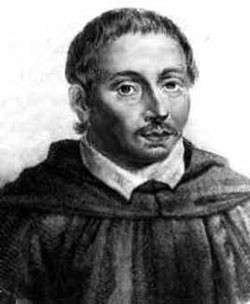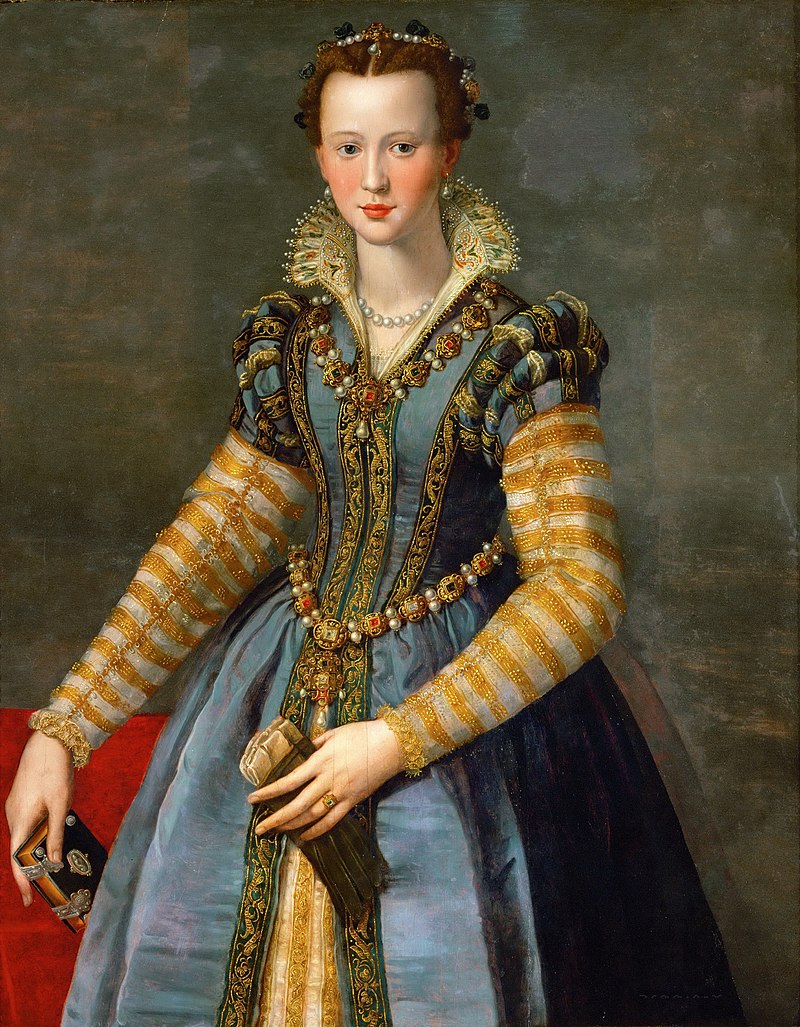This Week in Classical Music: October 2, 2023.Giulio Caccini.During the last couple of months, we’ve published several entries ontwo subjects: one, the musical transition from the Renaissance to the Baroque and early opera, and another, about some unsavory but talented characters in music.The protagonist of today’s entry falls into both categories.Giulio Caccini was born in Rome on October 8th, 1551.One episode that puts him into the “unsavory” category happened in 1576 when Caccini was in Florence employed by the court of Grand Duke Francesco I de’ Medici.Francesco had a brother, Pietro, who was married to the beautiful Eleonora (Leonora) di Garzia di Toledo.Pietro was known to be gloomy and violent, the marriage was unhappy, and Leonora had several affairs.Caccini, attempting to curry favors from the Duke’s family, spied on Leonora and then denounced her and her lover, Bernardino Antinori, to Pietro.Pietro brought Leonora to Villa Medici at Cafaggiolo, where he strangled her with a dog leash.Leonora was 23.Bernardino Antinori was imprisoned and also killed.The whole story is even more sordid and involves other characters and victims, but though fascinating, it goes even further into Italian history and away from music.One note: if the name of Antinori sounds familiar to wine lovers, it’s not by chance – Bernardino’s family has been making wines since 1385.These days Antinori produce some of the best Chiantis and Super-Tuscans in Italy.
Other episodes are not as gruesome but still attest to Caccini’s character.Two more talented composers worked at the court at the same time, Emilio de' Cavalieri and Jacopo Peri.In 1600, the wedding of Henry IV of France and Maria de' Medici was a very important event.Cavalieri, who oversaw all major festivities of the house of Medici, was expected to direct this one as well.The conniving Caccini had him denied the position, and while Cavalieri did write some of the music, it was Caccini who managed the staging (we described this event here).The disappointed Cavalieri left Florence never to return.As for Peri, the stories are more comical.Upon learning that Peri was writing an opera, Euridice, for the wedding of Maria de' Medici to Henry IV, he rushed to compose his own version using the same libretto and had it published before the first performance of Peri’s work.That wasn’t all; Caccini’s daughter Francesca, a talented singer, was to participate in the performance of Peri’s Euridice.Even though Peri wrote the music for the whole opera, Caccini rewrote the parts performed by Francesca and several other singers under his command, all that just to spite Peri and promote himself.Francesca Caccini, by the way, turned into an excellent composer in her own right.Her opera, La liberazione di Ruggiero dall’isola d’Alcina (The Liberation of Ruggiero from the Island of Alcina) was just staged by the Chicago Haymarket Opera Company (yesterday was the last performance).
Even though Caccini wrote three operas, he’s better remembered for his collection of songs called Le nuove musiche (the New Music), published in 1602.Here are two songs from this collection, Amor, io parte and Alme luci beate, but the whole collection is wonderful.In this 1983 recording, the soprano is Montserrat Figueras, the wife of Jordi Savall, who accompanies her on the Viola da Gamba (Figueras died in 2011).Hopkinson Smith is playing the lute.
Giulio Caccini, 2023
This Week in Classical Music: October 2, 2023. Giulio Caccini. During the last couple of months, we’ve published several entries on two subjects: one, the musical transition from the Renaissance to the Baroque and early opera, and another, about some unsavory but talented characters in music. The protagonist of today’s entry falls into both categories. Giulio Caccini was born in Rome on October 8th, 1551. One episode that puts him into the “unsavory” category happened in 1576 when Caccini was in Florence employed by the court of Grand Duke Francesco I de’ Medici. Francesco had a brother, Pietro, who was married to the beautiful Eleonora (Leonora) di Garzia di Toledo. Pietro was known to be gloomy and violent, the marriage was unhappy, and Leonora had several affairs. Caccini, attempting to curry favors from the Duke’s family, spied on Leonora and then denounced her and her lover, Bernardino Antinori, to Pietro. Pietro brought Leonora to Villa Medici at Cafaggiolo, where he strangled her with a dog leash. Leonora was 23. Bernardino Antinori was imprisoned and also killed. The whole story is even more sordid and involves other characters and victims, but though fascinating, it goes even further into Italian history and away from music. One note: if the name of Antinori sounds familiar to wine lovers, it’s not by chance – Bernardino’s family has been making wines since 1385. These days Antinori produce some of the best Chiantis and Super-Tuscans in Italy.
Renaissance to the Baroque and early opera, and another, about some unsavory but talented characters in music. The protagonist of today’s entry falls into both categories. Giulio Caccini was born in Rome on October 8th, 1551. One episode that puts him into the “unsavory” category happened in 1576 when Caccini was in Florence employed by the court of Grand Duke Francesco I de’ Medici. Francesco had a brother, Pietro, who was married to the beautiful Eleonora (Leonora) di Garzia di Toledo. Pietro was known to be gloomy and violent, the marriage was unhappy, and Leonora had several affairs. Caccini, attempting to curry favors from the Duke’s family, spied on Leonora and then denounced her and her lover, Bernardino Antinori, to Pietro. Pietro brought Leonora to Villa Medici at Cafaggiolo, where he strangled her with a dog leash. Leonora was 23. Bernardino Antinori was imprisoned and also killed. The whole story is even more sordid and involves other characters and victims, but though fascinating, it goes even further into Italian history and away from music. One note: if the name of Antinori sounds familiar to wine lovers, it’s not by chance – Bernardino’s family has been making wines since 1385. These days Antinori produce some of the best Chiantis and Super-Tuscans in Italy.
Other episodes are not as gruesome but still attest to Caccini’s character. Two more talented composers worked at the court at the same time, Emilio de' Cavalieri and Jacopo Peri. In 1600, the wedding of Henry IV of France and Maria de' Medici was a very important event. Cavalieri, who oversaw all major festivities of the house of Medici, was expected to direct this one as well. The conniving Caccini had him denied the position, and while Cavalieri did write some of the music, it was Caccini who managed the staging (we described this event here). The disappointed Cavalieri left Florence never to return. As for Peri, the stories are more comical. Upon learning that Peri was writing an opera, Euridice, for the wedding of Maria de' Medici to Henry IV, he rushed to compose his own version using the same libretto and had it published before the first performance of Peri’s work. That wasn’t all; Caccini’s daughter Francesca, a talented singer, was to participate in the performance of Peri’s Euridice. Even though Peri wrote the music for the whole opera, Caccini rewrote the parts performed by Francesca and several other singers under his command, all that just to spite Peri and promote himself. Francesca Caccini, by the way, turned into an excellent composer in her own right. Her opera, La liberazione di Ruggiero dall’isola d’Alcina (The Liberation of Ruggiero from the Island of Alcina) was just staged by the Chicago Haymarket Opera Company (yesterday was the last performance).
composers worked at the court at the same time, Emilio de' Cavalieri and Jacopo Peri. In 1600, the wedding of Henry IV of France and Maria de' Medici was a very important event. Cavalieri, who oversaw all major festivities of the house of Medici, was expected to direct this one as well. The conniving Caccini had him denied the position, and while Cavalieri did write some of the music, it was Caccini who managed the staging (we described this event here). The disappointed Cavalieri left Florence never to return. As for Peri, the stories are more comical. Upon learning that Peri was writing an opera, Euridice, for the wedding of Maria de' Medici to Henry IV, he rushed to compose his own version using the same libretto and had it published before the first performance of Peri’s work. That wasn’t all; Caccini’s daughter Francesca, a talented singer, was to participate in the performance of Peri’s Euridice. Even though Peri wrote the music for the whole opera, Caccini rewrote the parts performed by Francesca and several other singers under his command, all that just to spite Peri and promote himself. Francesca Caccini, by the way, turned into an excellent composer in her own right. Her opera, La liberazione di Ruggiero dall’isola d’Alcina (The Liberation of Ruggiero from the Island of Alcina) was just staged by the Chicago Haymarket Opera Company (yesterday was the last performance).
Even though Caccini wrote three operas, he’s better remembered for his collection of songs called Le nuove musiche (the New Music), published in 1602. Here are two songs from this collection, Amor, io parte and Alme luci beate, but the whole collection is wonderful. In this 1983 recording, the soprano is Montserrat Figueras, the wife of Jordi Savall, who accompanies her on the Viola da Gamba (Figueras died in 2011). Hopkinson Smith is playing the lute.